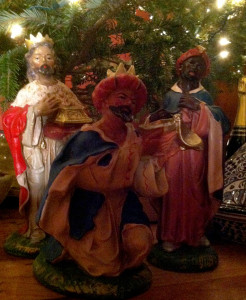TWELFTH DAY of CHRISTMAS:
Epiphany
It’s Epiphany, the day the Magi arrived in Bethlehem to see the child. Children in Italy have awoken to presents delivered over the course of the night by la befana, and in Spain and throughout Latin America, los tres reyes, the three kings, have done the same job. Today, la befana will be back to her housework, back to her sweeping, sweeping the holidays away until the winter solstice returns again next December. An old Italian saying sums it up: E l’epifania tutte le feste porta via.
Most of what we know of the Magi comes down through tradition and not through biblical writings. The story is that there were three wise men and that their names were Caspar, Melchior, and Balthasar, but in fact we don’t know their names for sure or how many there were. We do know, however, that there were three gifts. It’s an old, old story that we know well. The Magi followed the star, finally arrived at the place where Jesus lay, paid homage to him, and brought gifts to the child, gifts fit for royalty: gold, frankincense, and myrrh.
Epiphany is a Greek word, meaning “manifestation.” The local shepherds were the first to come see the child in the manger, but with the Magi, who came from far off kingdoms, the child was made manifest to the world. Epiphany has another meaning, as well, one that James Joyce spoke of, in which characters in stories, people in general, suddenly see things differently. The two kind of go hand in hand. Nothing would ever be the same after that first Christmas night, and nothing is ever the same after a personal epiphany, either.
And so with this night, our celebration of Christmas winds down. While Twelfth Night brings us raucous revelry, Epiphany is generally quieter. The day will proceed much like any other––here in the United States, for most of us it’s just another day at work. Even the Church in this country moves the date of Epiphany to a Sunday (it was yesterday by most church calendars), but traditionalists prefer to keep its date as it always was. In this house, we will celebrate with a quiet dinner. We’ll enjoy the music and the greenery and lights for one last night. And some time in the still quiet of this night, we’ll gather up the people in our home, step out onto the front porch, bundle up if it’s cold outside, and we’ll take turns writing with chalk above the front door the numbers and letters of a traditional inscription: 20+C+M+B+14. These are the initials of each of the Magi, punctuated by crosses and surrounded by the year. The chalk is supposed to be blessed chalk, but I doubt there are many priests left who remember this old tradition and who bother to bless chalk for their congregations, so I think any chalk would be fine, blessed or not. The writing is usually accompanied by a silent prayer that we’ll all be together to do this again next year. The inscription, a magic charm of protection and a reminder of the season, remains there for all to see and it weathers the year, sometimes washing away to a ghost of itself by the following year, and sometimes remaining as vibrant as ever.
After tonight, we might light the candles in our windows, but the Christmas lights outside will no longer be lit. All the greenery and the tree are to be removed. If you have the room, perhaps you can save your tree in a quiet corner of your garden. Just tuck it away there, off to the side, and next December, do what we do: use that tree to fuel your fire on the darkest night of the year that comes when the Winter Solstice returns next December. This is, I think, an honorable way to send off the tree that has brought your family so much joy this year, and continues the spiraling circle of time and seasons that gave that tree life in the first place. The tree, you, the Magi, the child, all are part of this same spiral.
Image: Three kings brought to us as gifts by our neighbors Don and Pat Cortese, Twelfth Night 2013.
